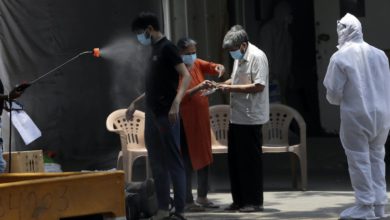
On a sunny Tuesday, 20-year-old Tyler Wirth hops on a lift at the University of Cincinnati dormitory construction site on Calhoun Street.
It’s a rickety ride with eight people crammed into the hoist, but Wirth smiles and assures it’s safe.
Before stepping off onto the 13th floor, the top floor of the residence hall that was recently gutted and is now being remodeled to accommodate 822 students, Wirth’s eyes light up.
“It’s probably my favorite view of Cincinnati,” he says.
And it is a nice view. On one side you can make out the crown atop the Great American Tower in the Cincinnati skyline and, on the other, you can look out across the whole of UC’s campus. Once the building is finished, some students might even be able to catch a football game from their dorm room window, gazing down into Nippert Stadium.

This is Wirth’s twelfth week in his current cooperative education experience with Messer Construction, though he also worked with the builder last spring and kept in touch with his supervisor during his summer courses. UC consistently ranks highly among university co-op programs. Officials said the program has only grown during the COVID-19 pandemic.
Wirth says he’s walked the building top to ground floor at least 50 times by now, doing safety walks three times or more each week. He likes being in the know about construction at the university. Sometimes his friends wonder aloud: “Man, what are they doing on Calhoun?” And Wirth can tell them – down to the number of beds the dorm will fit and which will be the first and last rooms ready for occupancy.
Starting at the top, Wirth circles each floor with his manager and UC's industrial hygienist and construction safety specialist John Burke for a safety check. They are looking to ensure general safety protocols are being met: scouting out fall hazards, ensuring power cords are tucked away and that platform and wheels on carts are locked. If any issues arise, Wirth notes them on his iPad and sends a photo to the proper foreman.
The words “safety is my responsibility” are displayed on his green hard hat for Messer, which ranked as the Cincinnati region's fifth-largest privately held company on the most recent Deloitte Cincinnati 100 list.
Wirth, one of the youngest people on the construction site, says the hard hat gives him the confidence to let other workers know if they need to make a safety adjustment. Some of those employees are twice his age, which can be awkward, he says.
One of Wirth’s goals when he started his fall co-op was to work on his communication skills. He says he’s gotten daily opportunities to do this by running morning meetings with the foremen, and he can already tell he’s getting better.

“Now I’m on a first-name basis with all of them,” Wirth says.
115 years of co-op at UC
The University of Cincinnati’s co-op program rose toNo. 4 in U.S. News & World Report’s latest rankings, released in mid-September this year. The local program has historically placed in the top 5 co-op programs in the country.
Its reputation is enough to attract students from all over the world. Anshumi Dhingra, a graduate student in UC's prestigious College of Design, Architecture, Art and Planning, completed her undergraduate degree at India's CEPT University. She told The Enquirer she was particular about the type of curriculum she wanted in a graduate program.
“At UC, the standout point was that it had co-op while you also study,” Dhingra said. Every other program she applied to had one internship experience towards the end of the degree while UC's graduate program requires two co-ops. “So you get, sort of, a gist of professional experience along with academics.”
The university actually founded the concept of cooperative education 115 years ago, said Gigi Escoe, vice provost for UC’s undergraduate studies and dean of the division of experience-based learning and career education. The first programs were for engineering students, but now students of any major can apply for positions within the university's more than 2,200 global partners.
Each co-op is specific to a student's individual needs, she said. And unlike an internship, the co-op is embedded into the student's academic curriculum. Escoe said UC is constantly looking to better its program, first, to meet growing and changing student needs, and then to meet the increasing demands of industry in the wake of pandemic-spurred workforce shortages.
“This is not following somebody around getting coffee,” Escoe said. "It's not job shadowing."
More: How UC is working to curb IT talent shortage through high school recruitment program
Undergraduate students in engineering, information technology and DAAP are required to complete at least three co-op experiences before graduation, Escoe said.

“So that when they graduate, they have almost two years of work experience," Escoe explained. "And they are usually hired into positions that are not entry-level, but they take into account the fact that they have two years of work experience, both in salary and title.”
Business students are also required to participate in a professional learning experience, and all other majors have an "experiential learning" requirement that can be fulfilled by a service-learning program, undergraduate research, study abroad, student teaching, clinical internships or a co-op.
Escoe said university students participate in over 8,000 co-op opportunities each year. Before the pandemic, students collectively earned upwards of $70 million annually. Last year, due to COVID-19, officials said students in co-op made a collective $58 million, roughly, though the number of students in the program did not decrease. And the number of partners actually increased, Escoe said, as more companies have been desperate for workers.
“Work is forever changed,” Escoe said, as a result of the pandemic. “And so young people that are coming out right now are going to have 50-, 60-year careers that are starting in this new world, right? And they’re going to emerge from that. So it’s not only digital. It’s how do you make friends? How do you do teamwork? How does ideation take place? So I have to prepare them for that workforce, not the one that existed in 2017. Because that one’s gone, forever.”
'Best decision I have ever made.'
Dhingra completed a co-op at City Studios Architecture in Over-the-Rhine last year and is now in the process of applying for her next co-op experience. As an international student, she says learning about American workplace culture is just as important to her as the design work.
For Sydney O'Connor, a 2021 UC graduate, the co-op program eased her fear of graduating without knowing if she actually liked the career she was preparing for. It wasn't until her third co-op at Tesla that she said she found a work culture and job description she could see herself in the long-term.
“Looking back on it, it was, without a doubt, the best decision I have ever made," O'Connor said about deciding to attend UC. "Not only was it helpful in deciding what I wanted to do, it was nice just to get a break from classes. It was nice to make some money. It makes UC incredibly affordable.”
Now O'Connor works as a firmware quality engineer at Apple, where she completed her final co-op through UC before graduating. She's heard gripes from coworkers about the student debt they incurred through expensive private schools on the West Coast. O'Connor is grateful for co-ops that allowed her to make money as opposed to spending it on tuition for those semesters.
Wirth, now in his third year at the university, says he prefers co-op to coursework.
"I feel like firsthand work experience is most important when you're going into a career, no matter what it is," he said. "You don't get the hands-on experience in classes."
Towards the end of his safety walk, Wirth takes a photo of a gaping hole on Calhoun Street where a guard is needed. His team puts up a red chain near the entrance to the site so no "zombies" – students walking with their eyes on their phones – accidentally walk in without the proper safety gear.
Burke gives him a fist bump for Wirth's good work today. Wirth smiles and walks back to his small office across the street. Soon he'll head home to his apartment less than half a mile away and get ready for track practice. He says he's grateful for Messer's flexibility with his athletic schedule and weekend competitions.
"It's kind of the perfect situation for me right now," he says. "Because they know that we're students and we still, you know, have that college life."
Source link







